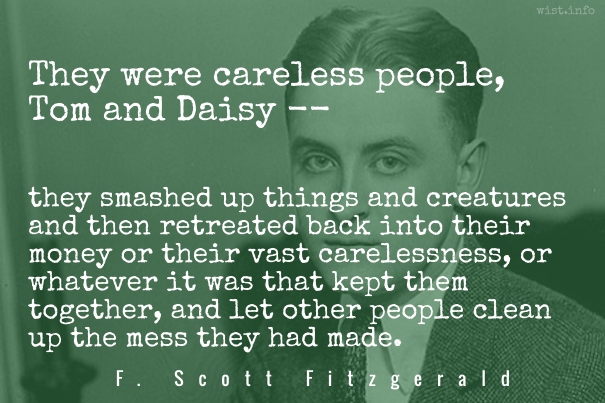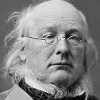You seem to have great possessions! How else can this be, but that you have preferred your own enjoyment to the consolation of the many? For the more you abound in wealth, the more you lack in love.
[ἀλλὰ μὴν φαίνῃ ἔχων κτήματα πολλά. Πόθεν ταῦτα; ἢ δῆλον ὅτι τὴν οἰκείαν ἀπόλαυσιν προτι μοτέραν τῆς τῶν πολλῶν παραμυθίας ποιούμενος. Ὅσον οὖν πλεονάζεις τῷ πλούτῳ, τοσοῦτον ἐλλείπεις τῇ ἀγάπῃ.]
Basil of Caesarea (AD 330-378) Christian bishop, theologian, monasticist, Doctor of the Church [Saint Basil the Great, Ἅγιος Βασίλειος ὁ Μέγας]
“To the Rich [Ὁμιλία πρὸς τοὺς πλουτούντας],” sermon (c. 368) [tr. Schroeder (2009)]
(Source)
In C. Paul Schroeder, ed., Saint Basil on Social Justice (2009).
Quotations about:
riches
Note not all quotations have been tagged, so Search may find additional quotes on this topic.
It takes a grate deal of money tew make a man ritch, but it don’t take but little virtew.
[It takes a great deal of money to make a man rich, but it doesn’t take but little virtue.]
Josh Billings (1818-1885) American humorist, aphorist [pseud. of Henry Wheeler Shaw]
Everybody’s Friend, Or; Josh Billing’s Encyclopedia and Proverbial Philosophy of Wit and Humor, ch. 144 “Affurisms: Gnats” (1874)
(Source)
Nothing more clearly shows how little God esteems his gift to men of wealth, money, position and other worldly goods, than the way he distributes these, and the sort of men who are most amply provided with them.
[Rien ne fait mieux comprendre le peu de chose que Dieu croit donner aux hommes, en leur abandonnant les richesses, l’argent, les grands établissements et les autres biens, que la dispensation qu’il en fait, et le genre d’hommes qui en sont le mieux pourvus.]
Jean de La Bruyère (1645-1696) French essayist, moralist
The Characters [Les Caractères], ch. 6 “Of Gifts of Fortune [Des Biens de Fortune],” § 24 (6.24) (1688) [tr. Stewart (1970)]
(Source)
See Alexander Pope.
(Source (French)). Alternate translations:
Nothing makes us better comprehend what little things God thinks he bestows on Mankind, when he suffers 'em to abound in Riches, Gold, Settlements, Stations, and other advantages, than the dispensations he makes of them, and the sort of men who are best provided.
[Bullord ed. (1696)]
Nothing makes us better comprehend what little things God thinks he bestows on Mankind, in suffering 'em to abound in Riches, Mony, great Preferments, and other Advantages, than the Distribution he makes of 'em, and the sort of Men who are best provided.
[Curll ed. (1713)]
Nothing makes us better understand what trifling things Providence thinks He bestows on men in granting them wealth, money, dignities, and other advantages, than the manner in which they are distributed and the kind of men who have the largest share.
[tr. Van Laun (1885)]
Scorn for wealth among philosophers was at bottom a desire to avenge themselves against fate, by despising the very things of which she deprived them. It was a strategic way of avoiding the humiliations of poverty, a roundabout way of gaining an esteem they could not gain through wealth.
[Le mépris des richesses était dans les philosophes un désir cache de venger leur mérite de l’injustice de la fortune par le mépris des mêmes biens dont elle les privait; c’était un secret pour se garantir de l’avilissement de la pauvreté; c’était un chemin détourné pour aller à la considération qu’ils ne pouvaient avoir par les richesses.]
François VI, duc de La Rochefoucauld (1613-1680) French epigrammatist, memoirist, noble
Réflexions ou sentences et maximes morales [Reflections; or Sentences and Moral Maxims], ¶54 (1665-1678) [tr. Kronenberger (1959)]
(Source)
This maxim appeared in the first edition, with various small modifications across subsequent editions.
(Source (French)). Alternate translations:
The contempt of wealth, in the Philosophers, was a secret desire of vindicating their merit, against the injustice of Fortune, by an affected slighting of those goods, whereof she depriv'd them. It was an humorous secret, which they had found out, to indemnifie themselves from the disparagement accessory to Poverty. In fine, it was a winding path, or by-way to get into that esteem, which they could not obtain by Riches.
[tr. Davies (1669), ¶170]
When the Philosophers despised Riches, it was because they had a mind to vindicate their own Merit, and take a Revenge upon the injustice of Fortune, by vilifying those Enjoyments which She had not given them: This was a secret to ward off the Contempt that Poverty brings, a kind of winding By-path to get into the Esteem of the World, and when Riches had not made them considerable, to make themselves so some other way.
[tr. Stanhope (1694), ¶55]
The contempt of riches in the philosophers was a concealed desire of revenging on Fortune the injustice done to their merit, by despising the good she denied them. It was a secret to shelter them from the ignominy of poverty ; a bye-way to arrive at the esteem they could not procure by wealth.
[pub. Donaldson (1783), ¶341; ed. Lepoittevin-Lacroix (1797), ¶54]
Contempt of riches in the old philosophers was a concealed desire of revenge, by despising the good which Fortune had denied them. It was an artful shelter from the disgrace of poverty: a by-way to arrive at that esteem which they could not procure by wealth.
[ed. Carville (1835), ¶301]
The contempt of riches among the philosophers was a hidden desire to revenge their merit for the injustice of Fortune, by contempt of the very advantages of which she deprived them. It was a secret to secure themselves from the degradation of poverty: it was a by road to arrive at that consideration which they could not obtain by riches.
[ed. Gowens (1851), ¶55]
The contempt of riches in philosophers was only a hidden desire to avenge their merit upon the injustice of fortune, by despising the very goods of which fortune had deprived them; it was a secret to guard themselves against the degradation of poverty, it was a back way by which to arrive at that distinction which they could not gain by riches.
[tr. Bund/Friswell (1871)]
The Philosophers' scorn of wealth was but their secret ambition to exalt their merit above fortune by deriding those blessings which Fate denied them. It was a ruse to shield them from the sordidness of poverty, and a subterfuge to attain that distinction which they could not achieve by wealth.
[tr. Heard (1917)]
Contempt of wealth was, among the early philosophers, due to a secret desire to vindicate their worth agaiunst the malignity of fate, by affecting to despise those very gifts of which it deprived them. It was a means of insurance against the ignominy of poverty, a round-about way of acquiring the esteem they were unable to command by the possession of wealth.
[tr. Stevens (1939)]
Philosophers have expressed their contempt for material riches; they thus reveal their wish to vindicate their merit on their fate by displaying their contempt for those gifts which fate has withheld from them; it is a secret remedy to save them from those degradations which poverty entails; it is also an indirect method for obtaining that respect which they cannot gain through wealth.
[tr. FitzGibbon (1957)]
The scorn for riches displayed by the philosophers was a secrete desire to recompense their own merit for the injustice of Fortune by scorning those very benefits she had denied them; it it was a private way of remaining unsullied by poverty, a devious path towards the high respect they could not command by wealth.
[tr. Tancock (1959)]
The contempt which philosophers professed for wealth, was but a hidden desire of getting revenge for their merit upon the injustice of Fortune, by despising those goods of which she had deprived them: it was a secret by which to protect themselves against the degradation of poverty; it was an alternate path by which to gain that consideration which they had not been able to attain through riches.
[tr. Whichello (2016)]
He called to mind all the millionaires he had ever read or heard of; they didn’t seem to get much fun out of their riches. The majority of them were martyrs to dyspepsia. They were often weighed down by the cares and responsibilities of their position; the only people who were unable to obtain an audience of them at any time were their friends; they lived in a glare of publicity, and every post brought them hundreds of begging letters, and a few threats; their children were in constant danger from kidnappers, and they themselves, after knowing no rest in life, could not be certain that even their tombs would be undisturbed. Whether they were extravagant or thrifty, they were equally maligned, and, whatever the fortune they left behind them, they could be absolutely certain that, in a couple of generations, it would be entirely dissipated.
F. Anstey (1856-1934) English novelist and journalist (pseud. of Thomas Anstey Guthrie)
The Brass Bottle, ch. 7 (1900)
(Source)
Let us not envy a certain class of men for their enormous riches; they have paid such an equivalent for them that it would not suit us; they have given for them their peace of mind, their health, their honour, and their conscience; this is rather too dear, and there is nothing to be made out of such a bargain.
[N’envions point à une sorte de gens leurs grandes richesses; ils les ont à titre onéreux, et qui ne nous accommoderait point: ils ont mis leur repos, leur santé, leur honneur et leur conscience pour les avoir; cela est trop cher, et il n’y a rien à gagner à un tel marché.]Jean de La Bruyère (1645-1696) French essayist, moralist
The Characters [Les Caractères], ch. 6 “Of Gifts of Fortune [Des Biens de Fortune],” § 13 (6.13) (1688) [tr. Van Laun (1885)]
(Source)
One translator suggestions the "certain class of men" refers to the partisans, or tax-farmers: private tax collectors, often of humble origin, who purchased the right to their job, and were notorious for turning tax collection into a profitable profession.
(Source (French)). Alternate translations:
Let us not envy some Men their great Riches; their Burthens would be too heavy for us; we cou'd not Sacrifice, as they do, Health, Quiet, Honour and Conscience, to obtain 'em: 'Tis to pay so dear for them that there is nothing to be got by the Bargain.
[Bullord ed. (1696)]
Let us not envy some Men their great Riches, their burden would be too heavy for us; we cou'd not sacrifice, as they do, Health, Quiet, Honour and Conscience, to obtain 'em: 'Tis to pay so dear for 'em, that there is nothing to be got by the Bargain.
[Curll ed. (1713)]
Let us not envy some Men their accountable Riches; their Burthen would be too heavy for us; we could not sacrifice, as they do, Health, Quiet, Honour and Conscience, to obtain them. It is to pay so dear for them, that the Bargain is a Loss.
[Browne ed. (1752)]
We need not envy certain people their great wealth; they acquired it at a heavy cost, which would not suit us; they staked their rest, their health, their honour and their conscience to acquire it; the price is too high, and there is nothing to be gained by such a bargain.
[tr. Stewart (1970)]
What Nature wants, commodious Gold bestows,
‘Tis thus we eat the bread another sows:
But how unequal it bestows, observe,
‘Tis thus we riot, while who sow it, starve.
What Nature wants (a phrase I much distrust)
Extends to Luxury, extends to Lust;
And if we count among the Needs of life
Another’s Toil, why not another’s Wife?
Useful, we grant, it serves what life requires,
But dreadful too, the dark Assassin hires:
Trade it may help, Society extend;
But lures the Pyrate, and corrupts the Friend:
It raises Armies in a nation’s aid,
But bribes a Senate, and the Land’s betray’d.Alexander Pope (1688-1744) English poet
“An Epistle to Allen, Lord Bathurst: Of the Use of Riches” (1733), Moral Essays, Epistle 3 (1735)
(Source)
Earthly riches can neither bless us nor our children with happiness; we must either lose them in this life or leave them to be enjoyed after our death by one, we cannot tell whom, perhaps by those we would not should have them.
[Felices enim uel nos uel filios nostros non diuitiae terrenae faciunt aut nobis uiuentibus amittendae aut nobis mortuis a quibus nescimus uel forte a quibus nolumus possidendae.]Augustine of Hippo (354-430) Christian church father, philosopher, saint [b. Aurelius Augustinus]
City of God [De Civitate Dei], Book 5, ch. 18 (5.18) (AD 412-416) [tr. Healey (1610)]
(Source)
(Source (Latin)). Alternate translations:
For it is not earthly riches which make us or our sons happy; for they must either be lost by us in our lifetime, or be possessed when we are dead, by whom we know not, or perhaps by whom we would not.
[tr. Dods (1871)]
The riches of this earth can make neither us nor our children happy, if they are to be lost while we are alive or, after we are dead, are to pass to people we do not know or, perhaps, dislike.
[tr. Zema/Walsh (1950)]
For neither we nor our children are made happy by earthly riches, since they are bound either to be lost while we are living or to be acquired after our death by persons unknown and perhaps unwelcome.
[tr. Green (Loeb) (1963)]
Happiness, whether for us or for our children, is not the result of earthly riches, which must either be lost by us in our lifetime or else must pass after our death into the possession of those we do not know or, it may be, of those whom we do not wish to have them.
[tr. Bettenson (1972)]
For neither we nor our sons are made happy by earthly riches. These things must either be lost while we are still alive or, after we are dead, acquired by someone whom we do not know, or perhaps by someone whom we would not wish to have them.
[tr. Dyson (1998)]
For earthly riches do not make either us or our children happy; they will either be lost while we are still alive or will pass, after our death, to someone we do not know or even to someone we do not want.
[tr. Babcock (2012)]
If you desire power, desire nothing
but contentment, which is its own kingdom.Sa'adi (1184-1283/1291?) Persian poet [a.k.a. Sa'di, Moslih Eddin Sa'adi, Mushrif-ud-Din Abdullah, Muslih-ud-Din Mushrif ibn Abdullah, Mosleh al-Din Saadi Shirazi, Shaikh Mosslehedin Saadi Shirazi]
Gulistān [Rose Garden, گُلِستان], ch. 2 “On the Morals of Dervishes,” Story 28 (1258) [tr. Rehatsek/Newman (2004)]
(Source)
Alternate translations:
If you want riches, seek only for contentment which is inestimable wealth.
[tr. Gladwin (1806)]
Wouldest thou be rich, seek, but content to gain;
For this a treasure is that ne'er will harm.
[tr. Eastwick (1852)]
If thou wishest for power, covet nothing
Except contentment which is sufficient happiness.
[tr. Burton (1888)]
If thou covetest riches, ask not but for contentment, which is an immense treasure.
[tr. Ross (1900)]
Seek not, if thou desire riches,
Aught but contentment, for it is an agreeable treasure.
[tr. Platts (1904)]
Better is a little with contentment than great Treasure; and trouble therewith.
Abigail Adams (1744-1818) American correspondent, First Lady (1797-1801)
Letter to Mary Smith Cranch (1790-02-20)
(Source)
Call me a scoundrel, only call me rich!
All ask how great my riches are, but none
Whether my soul is good.[ἔα με κερδαίνοντα κεκλῆσθαι κακόν]
Euripides (485?-406? BC) Greek tragic dramatist
Bellerophon [Βελλεροφῶν], frag. 181 (Nauck, TGF) (c. 430 BC) [tr. Gummere (1925)]
(Source)
Barnes frag. 65. Found (in Latin) in Seneca, Epistulae morales ad Lucilium, 115.14:
Sine me vocari pessimum, ut dives vocer.
An dives, omnes quaerimus, nemo, an bonus.
(Source (Greek)). Alternate translations:
If any gain ensue, I am content.
To be term'd wicked. We all ask this question,
Whether a man be rich, not whether virtuous.
[tr. Wodhull (1809)]
Let me be called a scoundrel, but a rich one.
We all ask if he’s rich, not if he’s good.
[Source]
Others lash the unknown seas with oars,
Rush at the sword, pay court in royal halls.
One destroys a city and its homes
To drink from jewelled cups and sleep on scarlet;
One hoards his wealth and lies on buried gold.
One gapes dumbfounded at the speaker’s stand;
At the theater, still another, open-mouthed,
Reels before crescendos of applause
From the tiers where mob and dignitaries sit.
Others are keen to drench themselves in blood,
Their brothers’ blood, and, exiled, change their homes
And winsome hearths, to range abroad for room
To live in, underneath a foreign sun.[Sollicitant alii remis freta caeca ruuntque
in ferrum, penetrant aulas et limina regum;
hic petit excidiis urbem miserosque Penatis,
ut gemma bibat et Sarrano dormiat ostro;
condit opes alius defossoque incubat auro;
hic stupet attonitus rostris; hunc plausus hiantem
per cuneos — geminatus enim plebisque patrumque —
corripuit; gaudent perfusi sanguine fratrum,
exsilioque domos et dulcia limina mutant
atque alio patriam quaerunt sub sole iacentem.]Virgil (70-19 BC) Roman poet [b. Publius Vergilius Maro; also Vergil]
Georgics [Georgica], Book 2, l. 504ff (2.504-513) (29 BC) [tr. Bovie (1956)]
(Source)
Virgil contrasting violent, ambitious, vain, and rootless life of city folk (evoking the Roman civil wars), in contrast to the bucolic peace and sense of home enjoyed by farmers.
(Source (Latin)). Alternate translations:
Some vex the Sea, and some to war resorts,
Attend on Kings, and waite in Princes Courts.
This would his Countrey, and his God betray
To drink in Jems, and on proud scarlet lye.
This hides his wealth, and broods on hidden gold,
This loves to plead, and that to be extold
Through all the seats of Commons, and the sires.
To bathe in's brothers blood this man desires.
Some banish'd, must their native seats exchange,
And Countries, under other Climates range.
[tr. Ogilby (1649)]
Some to the Seas, and some to Camps resort,
And some with Impudence invade the Court.
In foreign Countries others seek Renown,
With Wars and Taxes others waste their own.
And Houses burn, and household Gods deface,
To drink in Bowls which glitt'ring Gems enchase:
To loll on Couches, rich with Cytron Steds,
And lay their guilty Limbs in Tyrian Beds.
This Wretch in Earth intombs his Golden Ore,
Hov'ring and brooding on his bury'd Store.
Some Patriot Fools to pop'lar Praise aspire,
By Publick Speeches, which worse Fools admire.
While from both Benches, with redoubl'd Sounds,
Th' Applause of Lords and Commoners abounds.
Some through Ambition, or thro' Thirst of Gold;
Have slain their Brothers, or their Country sold:
And leaving their sweet Homes, in Exile run
To Lands that lye beneath another Sun.
[tr. Dryden (1709), l. 720ff]
Some rush to battle, vex with oars the deep,
Or in the courts of Kings insidious creep;
For cups of gem, and quilts of Tyrian, die,
Others remorseless loose each public tie:
On hoarded treasures these ecstatic gaze,
Those eye the Rostra, stupid with amaze:
This for the theatre's applauding roar
Sighs: with the blood of brothers sprinkled o'er
From their dear homes to exile others run,
And seek new seats beneath a distant sun.
[tr. Nevile (1767), l. 565ff]
Some vex with restless oar wild seas unknown.
Some rush on death, or cringe around the throne;
Stern warriors here beneath their footsteps tread
The realm that rear'd them, and the hearth that fed,
To quaff from gems, and lull to transient rest
The wound that bleeds beneath the Tyrian vest.
These brood with sleepless gaze o'er buried gold,
The rostrum these with raptur'd trance behold,
Or wonder when repeated plaudits raise
'Mid peopled theatres the shout of praise;
These with grim joy, by civil discord led,
And stain'd in battles where a brother bled.
From their sweet household hearth in exile roam,
And seek beneath new suns a foreign home.
[tr. Sotheby (1800)]
Some vex the dangerous seas with oars, some rush into arms, some work their way into courts, and the palaces of kings. One destines a city and wretched families to destruction, that he may drink in gems and sleep on Tyrian purple. Another hoards up wealth, and broods over buried gold. One, astonished at the rostrum, grows giddy; another peals of applause along the rows, (for it is redoubled both by the people and the fathers,) have captivated, and set agape; some rejoice when stained with their brother's blood; and exchange their homes and sweet thresholds for exile, and seek a country lying under another sun.
[tr. Davidson (1854)]
While others vex dark Hellespont with oars,
Leap on the sword, or dash through royal stores,
Storm towns and homesteads, in their vile desire
To quaff from pearl, and sleep on tints of Tyre;
While others hoard and brood on buried dross,
And some are moonstruck at the pleader's gloss;
While this man gapes along the pit, to hear
The mob and senators renew their cheer;
And others, reeking in fraternal gore,
With songs of triumph quit their native shore,
Abjure sweet home for banishment, and run
In quest of country 'neath another sun --
[tr. Blackmore (1871), l. 602ff]
Others are startling the darkness of the deep with oars, rushing on the sword's pint, winning their way into the courts and ante-chambers of kings; another is dooming a city to ruin and its homes to misery, that he may drink from jewelled cups and sleep on Tyrian purple; another hoards his wealth, and broods o'er buried gold; this man is dazzled and amazed by the eloquence of the rostra; that man the applause of commoners and senators, as it rolls redoubled through the benches, transports agape with wonder; they steep their hands in brothers' blood and joy, they change their homes and the thresholds of affection for the land of exile, and seek a fatherland that lies beneath another sun.
[tr. Wilkins (1873)]
Others vex
The darksome gulfs of Ocean with their oars,
Or rush on steel: they press within the courts
And doors of princes; one with havoc falls
Upon a city and its hapless hearths,
From gems to drink, on Tyrian rugs to lie;
This hoards his wealth and broods o'er buried gold;
One at the rostra stares in blank amaze;
One gaping sits transported by the cheers,
The answering cheers of plebs and senate rolled
Along the benches: bathed in brothers' blood
Men revel, and, all delights of hearth and home
For exile changing, a new country seek
Beneath an alien sun.
[tr. Rhoades (1881)]
These dare the ocean, and invite the storm,
This rage, and this the courtier’s wiles deform;
All faith, all right the traitor’s acts defy,
From gems to drink, on Tyrian purple lie;
One broods in misery o’er his hoarded gold.
And one in chains the people’s plaudits hold.
There stains of blood pollute a brother’s hand,
And he in terror flies his father’s land.
[tr. King (1882), l. 514ff]
Some vex the dangerous seas with oars, or rush into arms, or work their way into courts and the palaces of kings: one marks out a city and its wretched homes for destruction, that he may drink from jewelled cups and sleep on Tyrian purple. Another hoards up wealth, and lies sleepless on his buried gold. One, in bewildered amazement, gazes at the Rostra; another, in open-mouthed delight, the plaudits of the commons and the nobles, redoubled along benches, have arrested: some take pleasure in being drenched with a brother’s blood; and exchange their homes and dear thresholds for exile, and seek a country lying under another sun.
[tr. Bryce (1897)]
Others vex blind sea-ways with their oars, or rush upon the sword, pierce the courts and chambers of kings; one aims destruction at the city and her wretched homes, that he may drink from gems and sleep on Tyrian scarlet; another heaps up wealth and broods over buried gold; one hangs rapt in amaze before the Rostra; one the applause of populace and senate re-echoing again over the theatre carries open-mouthed away: joyfully they steep themselves in blood of their brethren, and exchange for exile the dear thresholds of their homes, and seek a country spread under an alien sun.
[tr. Mackail (1899)]
Others may tempt with oars the printless sea, may fling
Their lives to the sword, may press through portals and halls of a king.
This traitor hath ruined his country, hath blasted her homes, thereby
To drink from a jewelled chalice, on Orient purple to lie;
That fool hoards up his wealth, and broods o'er his buried gold;
That simple-one gazes rapt on the rostra: the loud cheers rolled
Down the theatre-seats, as Fathers and people acclaiming stood,
Have entranced yon man; men drench them with joy in their brethren's blood;
Into exile from home and its sweet, sweet threshold some have gone
Seeking a country that lieth beneath an alien sun.
[tr. Way (1912), l. 503ff]
Let strangers to such peace
Trouble with oars the boundless seas or fly
To wars, and plunder palaces of kings;
Make desolate whole cities, casting down
Their harmless gods and altars, that one's wine
May from carved rubies gush, and slumbering head
On Tyrian pillow lie. A man here hoards
His riches, dreaming of his buried gold;
Another on the rostrum's flattered pride
Stares awe-struck. Him th' applause of multitudes.
People and senators, when echoed shouts
Ring through the house approving, quite enslaves.
With civil slaughter and fraternal blood
One day such reek exultant, on the next
Lose evermore the long-loved hearth and home.
[tr. Williams (1915)]
Others brave with oars seas unknown, dash upon the sword, or press their way into courts and the chambers of kings. One wreaks ruin on a city and its wretched homes, and all to drink from a jewelled cup and sleep on Tyrian purple; another hoards wealth and gloats over buried gold; one stares in admiration at the rostra; another, open-mouthed, is carried away by the applause of high and low which rolls again and again along the benches. They steep themselves in their brothers’ blood and glory in it; they barter their sweet homes and hearths for exile and seek a country that lies beneath an alien sun.
[tr. Fairclough (Loeb) (1916)]
Other men dare the sea with their oars blindly, or dash
On the sword, or insinuate themselves into royal courts:
One ruins a whole town and the tenements of the poor
In his lust for jewelled cups, for scarlet linen to sleep on,
One piles up great wealth, gloats over his cache of gold;
One gawps at the public speakers; one is worked up to hysteria
By the plaudits of senate and people resounding across the benches:
These shed their brothers’ blood
Merrily, they barter for exile their homes beloved
And leave for countries lying under an alien sun.
[tr. Day-Lewis (1940)]
Others churn blind straits with their oars, and rush to the sword, force their way across the thresholds and into the courts of kings; [...] They rejoice, soaked in their brothers’ blood, exchange their own sweet thresholds for exile and seek a fatherland under another sun.
[tr. Miles (1980)]
Some vex with oars uncharted waters, some
Rush on cold steel, some seek to worm their way
Into the courts of kings. One is prepared
To plunge a city's homes in misery
All for a jewelled cup and a crimson bedspread;
Another broods on a buried hoard of gold.
This one is awestruck by the platform's thunder;
That one, enraptured, gapes ad the waves of applause
from high and low rolling across the theater.
Men revel steeped in brothers' blood, exchange
The hearth they love for banishment, and seek
A home in lands benath an alien sun.
[tr. Wilkinson (1982)]
Others trouble unknown seas with oars, rush on
their swords, enter the gates and courts of kings.
This man destroys a city and its wretched houses,
to drink from a jewelled cup, and sleep on Tyrian purple:
that one heaps up wealth, and broods about buried gold:
one’s stupefied, astonished by the Rostra: another, gapes,
entranced by repeated applause, from people and princes,
along the benches: men delight in steeping themselves
in their brothers’ blood, changing sweet home and hearth for exile,
and seeking a country that lies under an alien sun.
[tr. Kline (2001)]
Others slap their oars on dark, unknown seas, fall on their swords,
or thrust themselves into royal courts and palaces.
One man aims to destroy a city and its humble homes -- just
to drink from a jeweled goblet and sleep on Tyrian purple;
another stores up treasures and broods on his buried gold.
Wide-eyed, one gawks at the forum's speakers; another,
mouth agape, is swept away when lower class and upper both
applaud a statesman. Dripping with their brothers' gore,
they exult, exchanging familiar homes and hearths for exile,
they seek a fatherland that lies beneath a foreign sun.
[tr. Lembke (2004)]
Others fret with oars uncharted seas, or rush
upon the sword, or infiltrate the courts and vestibules of kings.
One visits devastation on a city and its wretched hearths
that he may slurp from a jewelled cup and snore on Tyrian purple.
Another hoards treasure and broods over buried gold.
One wonders thunderstruck at the podium, one gapes
transported by the applause of senators and commonfolk
resounding through the galleries. Drenched in their brothers' blood
they exult, and trade exile for their homes and sweet porches,
and seek a homeland under an alien sun.
[tr. Johnson (2009)]
There are those who with their oars disturb the waters
Of dangerous unknown seas, and those who rush
Against the sword, and those who insinuate
Their way into the chamber of a king:
There's one who brings down ruin on a city
And all its wretched households, in his desire
To drink from an ornate cup and go to sleep
On Tyrian purple coverlets at night;
There's the man who heaps up gold, and hides it away,
There's he who stares up stupefied at the Rostrum;
There's the open-mouthed, undone astonishment
Of the one who hears the waves and waves of the wild
Applause of the close packed crowd in the theater;
There are those who bathe in their brothers' blood, rejoicing;
And those who give up house and home for exile,
Seeking a land an alien sun shines on.
[tr. Ferry (2015)]
Where large sums of money are concerned, it is advisable to trust nobody.
Remember that we can own only what we can assimilate and appreciate, no more. Many wealthy people are little more than janitors of their possessions.
Frank Lloyd Wright (1867-1959) American architect, interior designer, writer, educator [b. Frank Lincoln Wright]
On Architecture: Selected Writings (1894-1940) (1941)
(Source)
A society which reverences the attainment of riches as the supreme felicity will naturally be disposed to regard the poor as damned in the next world, if only to justify making their life a hell in this.
R. H. Tawney (1880-1962) English writer, economist, historian, social critic [Richard Henry Tawney]
Religion and the Rise of Capitalism, ch. 4: The Puritan Movement, sec. 4 “The New Medicine for Poverty” (1926)
(Source)
Originally delivered as Holland Lectures, Kings College (Feb-Mar 1922).
For life without life’s joys
Is living death; and such a life is his.
Riches and rank and show of majesty
And state, where no joy is, are empty, vain
And unsubstantial shadows, of no weight
To be compared with happiness of heart.[τὰς γὰρ ἡδονὰς
ὅταν προδῶσιν ἄνδρες, οὐ τίθημ᾽ ἐγὼ
ζῆν τοῦτον, ἀλλ᾽ ἔμψυχον ἡγοῦμαι νεκρόν.
πλούτει τε γὰρ κατ᾽ οἶκον, εἰ βούλει, μέγα
καὶ ζῆ τύραννον σχῆμ᾽ ἔχων: ἐὰν δ᾽ ἀπῇ
τούτων τὸ χαίρειν, τἄλλ᾽ ἐγὼ καπνοῦ σκιᾶς
οὐκ ἂν πριαίμην ἀνδρὶ πρὸς τὴν ἡδονήν]Sophocles (496-406 BC) Greek tragic playwright
Antigone, l. 1165ff [Messenger] (441 BC) [tr. Watling (1947), Epilogos, l. 977ff]
(Source)
Original Greek. Alternate translations:
For him I reckon but
An animate corpse, and not a living man,
Whose life's delights are cast away. Thy house,
I grant thee, may be richly stored with wealth;
And thou may'st live in royal pomp: but if
Joy is not there the while, and I must lose
All happiness thereby, I would not give
Smoke's shadow as the price of all the rest.
[tr. Donaldson (1848)]
For a life
Without life's joys I count a living death.
You'll tell me he has ample store of wealth,
The pomp and circumstance of kings; but if
These give no pleasure, all the rest I count
The shadow of a shade, nor would I weigh
His wealth and power 'gainst a dram of joy.
[tr. Storr (1859)]
For when a man is lost to joy,
I count him not to live, but reckon him
A living corse. Riches belike are his,
Great riches and the appearance of a King;
But if no gladness come to him, all else
Is shadow of a vapour, weighed with joy.
[tr. Campbell (1873)]
When a man has forfeited his pleasures, I do not reckon his existence as life, but consider him just a breathing corpse. Heap up riches in your house, if you wish! Live with a tyrant's pomp! But if there is no joy along with all of that, I would not pay even the shadow of smoke for all the rest, compared with joy.
[tr. Jebb (1891)]
For when a man hath forfeited his pleasures, I count him not as living, -- I hold him but a breathing corpse. Heap up riches in thy house, if thou wilt; live in kingly state; yet, if there be no gladness therewith, I would not give the shadow of a vapour for all the rest, compared with joy.
[tr. Jebb (1917)]
Who can say
That a man is still alive when his life’s joy fails?
He is a walking dead man. Grant him rich,
Let him live like a king in his great house:
If his pleasure is gone, I would not give
So much as the shadow of smoke for all he owns.
[tr. Fitts/Fitzgerald (1939), l. 910ff]
Yes, when a man has lost all happiness,
he's not alive. Call him a breathing corpse.
Be very rich at home. Live as a king.
But once your joy has gone, though these are left
they are smoke's shadow to lost happiness.
[tr. Wyckoff (1954)]
He who forfeits joy
Forfeits his life; he is a breathing corpse.
Heap treasures in your palace, if you will,
And wear the pomp of royalty; but if
You have no happiness, I would not give
A straw for all of it, compared with joy.
[tr. Kitto (1962)]
Believe me,
when a man has squandered his true joys,
he's good as dead, I tell you, a living corpse.
Pile up riches in your house, as much as you like --
live like a king with a huge show of pomp,
but if real delight is missing from the lot,
I wouldn't give you a wisp of smoke for it,
not compared to joy. [tr. Fagles (1982), l. 1284ff]
When every source of joy deserts a man,
I don't call him alive: he's an animated corpse.
For my money, you can get rich as you want,
You can wear the face of a tyrant,
But if you have no joy in this,
Your life's not worth the shadow of a puff of smoke.
[tr. Woodruff (2001)]
Whenever men forfeit their pleasures, I do not regard
such a man as alive, but I consider him a living corpse.
Be very wealthy in your household, if you wish, and live
the style of absolute rulers, but should the enjoyment of these
depart, what is left, compared to pleasure,
I would not buy from a man for a shadow of smoke.
[tr. Tyrell/Bennett (2002)]
When a man’s body has lost all sense of joy, you can say he’s not alive any more. He is a living corpse. You can have as much wealth in your house as you like and you can live like a king but when joy is missing then all those other things I wouldn’t exchange for the price of the shadow of smoke -- not against the sweetness of joy!
[tr. Theodoridis (2004), "Herald"]
For when a man has lost
what gives him pleasure, I don’t include him
among the living -- he’s a breathing corpse.
Pile up a massive fortune in your home,
if that’s what you want -- live like a king.
If there’s no pleasure in it, I’d not give
to any man a vapour’s shadow for it,
not compared to human joy.
[tr. Johnston (2005), l. 1296ff]
But when people lose their pleasures, I do not consider this life -- rather, it is just a corpse with a soul.
[tr. @sentantiq (2018)]
As soon as riches came to be held in honour, when glory, dominion, and power followed in their train, virtue began to lose its lustre, poverty to be considered a disgrace, blamelessness to be termed malevolence. Therefore as the result of riches, luxury and greed, united with insolence, took possession of our young manhood. They pillaged, squandered; set little value on their own, coveted the goods of others; they disregarded modesty, chastity, everything human and divine; in short, they were utterly thoughtless and reckless.
[Postquam divitiae honori esse coepere et eas gloria, imperium, potentia sequebatur, hebescere virtus, paupertas probro haberi, innocentia pro malivolentia duci coepit. Igitur ex divitiis iuventutem luxuria atque avaritia cum superbia invasere; rapere, consumere, sua parvi pendere, aliena cupere, pudorem, pudicitiam, divina atque humana promiscua, nihil pensi neque moderati habere.]
Sallust (c. 86-35 BC) Roman historian and politician [Gaius Sallustius Crispus]
Bellum Catilinae [The War of Cateline; The Conspiracy of Catiline], ch. 12, sent. 1-2 [tr. Rolfe (1931)]
(Source)
Original Latin. Alt. trans.:
- "Riches became the epidemic passion; and where honours, imperial sway, and power, followed in their train, virtue lost her influence, poverty was deemed the meanest disgrace, and innocence was thought to be no better than a mark for malignity of heart. In this manner riches engendered luxury, avarice, and pride; and by those vices the Roman youth were enslaved. Rapacity and profusion went on increasing; regardless of their own property, and eager to seize that of their neighbours, all rushed forward without shame or remorse, confounding every thing sacred and profane, and scorning the restraint of moderation and justice." [tr. Murphy (1807)]
- "When riches began to be held in high esteem, and attended with glory, honour, and power, virtue languished, poverty was deemed a reproach, and innocence passed for ill-nature. And thus luxury, avarice, and pride, all springing from riches, enslaved the Roman youth; they wantoned in rapine and prodigality; undervalued their own, and coveted what belonged to others; trampled on modesty, friendship, and continence; confounded things divine and human; and threw off all manner of consideration and restraint." [tr. Rose (1831)]
- "After that riches began to be an honour and glory, and command and power followed them, virtue began to languish, poverty to be accounted matter of reproach, and innocence to be considered as malignity. Therefore from riches, luxury and avarice with pride came in upon our youth. They ravaged and wasted every thing, their own property they valued at a trifle, that of other persons they coveted, and had not the least care for, or moderation in, shame, modesty, sacred or profane things, which were all the same to them." [Source (1841)]
- "When wealth was once considered an honor, and glory, authority, and power attended on it, virtue lost her influence, poverty was thought a disgrace, and a life of innocence was regarded as a life of ill-nature. From the influence of riches, accordingly, luxury, avarice, and pride prevailed among the youth; they grew at once rapacious and prodigal; they undervalued what was their own, and coveted what was another’s; they set at naught modesty and continence; they lost all distinction between sacred and profane, and threw off all consideration and self-restraint." [tr. Watson (1867)]
- "Riches became a means of distinction and glory, power and influence followed their possession. As a result the edge of virtue was dulled, poverty was accounted a disgrace, and uprightness a kind of ill-nature. Riches made the youth prey to luxury, avarice, and pride: at once grasping and prodigal, they valued lightly their own property, while the coveted that of others; all modesty and purity, alike things human and things divine, everything, in short, was despised and disregarded." [tr. Pollard (1882)]
- "After riches began to be a source of honour and to be attended by glory, command and power, prowess began to dull, poverty to be considered a disgrace and blamelessness to be regarded as malice. In the wake of riches, therefore, young men were attacked by luxury and avarice along with haughtiness; they seized, they squandered; they placed little weight on their own property and desired that of others; they considered propriety and unchastity, divine and human matters, as indistinguishable, and nothing as worth weight or restraint." [tr. Woodman (2007)]
Avarice, on the other hand, implies a zeal for money, an object for which no philosopher ever yearned. Tainting the body and mind of the strong, it weakens them as by some deadly poison; it is always boundless, always insatiable; plenty and want alike fail to lessen it.
[Avaritia pecuniae studium habet, quam nemo sapiens concupivit; ea quasi venenis malis imbuta corpus animumque virilem effeminat, semper infinita, insatiabilis est, neque copia neque inopia minuitur.]
Sallust (c. 86-35 BC) Roman historian and politician [Gaius Sallustius Crispus]
Bellum Catilinae [The War of Cateline; The Conspiracy of Catiline], ch. 11, sent. 3 [tr. Pollard (1882)]
(Source)
Alt. trans.:
- "Avarice, on the other hand, aims at an accumulation of riches; a passion unknown in liberal minds. It may be called a compound of poisonous ingredeients; it has power to enervate the body, and debauch the best understanding; always unbounded; never satisfied; in plenty and in want equally craving and rapacious." [tr. Murphy (1807)]
- "Avarice has money for its object, which no wise man ever coveted. This vice, as if impregnated with deadly poison, enervated both soul and body; is always boundless and insatiable; nor are its cravings lessened by plenty or want." [tr. Rose (1831)]
- "Avarice has a longing for money, which no wise man ever desired. This passion, as if it were imbued with deadly poisons, enervates the body and mind of man. It is always boundless, insatiable, is neither diminished by plenty nor want." [Source (1841)]
- "But avarice has merely money for its object, which no wise man has ever immoderately desired. It is a vice which, as if imbued with deadly poison, enervates whatever is manly in body or mind. It is always unbounded and insatiable, and is abated neither by abundance nor by want." [tr. Watson (1867)]
- "Avarice implies a desire for money, which no wise man covets; steeped as it were with noxious poisons, it renders the most manly body and soul effeminate; it is ever unbounded and insatiable, nor can either plenty or want make it less." [tr. Rolfe (1931)]
- "Avarice involves an enthusiasm for money (which no wise man has ever desired): as if saturated with a harmful poison, it feminizes the manly body and mind, knows neither limit nor surfeit, and lessened by neither sufficiency nor insufficiency." [tr. Woodman (2007)]
Focusing your life solely on making a buck shows a certain poverty of ambition.
Barack Obama (b. 1961) American politician, US President (2009-2017)
Commencement Address, Knox College, Galesburg, IL (4 Jun 2005)
(Source)
People say law, but they mean wealth.
It is not merely that the ownership of any substantial share in the national wealth is concentrated to-day in the hands of a few hundred thousand families, and that at the end of an age which began with an affirmation of the rights of property, proprietary rights are, in fact, far from being widely distributed. Nor is it merely that what makes property insecure to-day is not the arbitrary taxation of unconstitutional monarchies or the privileges of an idle noblesse, but the insatiable expansion and aggregation of property itself, which menaces with absorption all property less than the greatest, the small master, the little shopkeeper, the country bank, and has turned the mass of mankind into a proletariat working under the agents and for the profit of those who own.
Convinced that character is all and circumstances nothing, [the Puritan] sees in the poverty of those who fall by the way, not a misfortune to be pitied and relieved, but a moral failing to be condemned, and in riches, not an object of suspicion but the blessing which rewards the triumph of energy and will.
R. H. Tawney (1880-1962) English writer, economist, historian, social critic [Richard Henry Tawney]
Religion and the Rise of Capitalism, ch. 4 (1926)
(Source)
He who withholds but a pennyworth of worldly goods from his neighbor, knowing him to be in need of it, is a robber in the sight of God.
Meister Eckhart (c. 1260-1328?) German theologian, philosopher, mystic [a.k.a. Johannes Eckhart von Hochheim; Eckhart; Eckehart]
Meister Eckhart, Tractate 6, “Sister Katrei” [ed. Pfeiffer (1857), tr. Evans]
(Source)
No man can tell whether he is rich or poor by turning to his ledger. It is the heart that makes a man rich. He is rich or poor according to what he is, not according to what he has.
Of great riches there is no real use, except it be in the distribution; the rest is but conceit.
Francis Bacon (1561-1626) English philosopher, scientist, author, statesman
“Of Riches,” Essays, No. 34 (1625)
(Source)
I cannot call riches better than the baggage of virtue; the Roman word is better, “impedimenta;” for as the baggage is to an army, so is riches to virtue; it cannot be spared nor left behind, but it hindereth the march; yea, and the care of it sometimes loseth or disturbeth the victory.
Francis Bacon (1561-1626) English philosopher, scientist, author, statesman
“Of Riches,” Essays, No. 34 (1625)
(Source)
They were careless people, Tom and Daisy — they smashed up things and creatures and then retreated back into their money or their vast carelessness, or whatever it was that kept them together, and let other people clean up the mess they had made.
Riches are a trust. … Power is a trust. So also is genius or every degree of wisdom. … Talents are a trust, too; that is the condition of their increase. They must be put out to use, or they will ruin the steward.
If Heaven had looked upon riches to be a valuable thing, it would not have given them to such a scoundrel.
Jonathan Swift (1667-1745) English writer and churchman
Letter to Miss Vanhomrigh (12 Aug 1720)
(Source)
Poor and free rather than rich and enslaved. Of course, men want to be both rich and free, and this is what leads them at times to be poor and enslaved.
[Pauvre et libre plutôt que riche et asservi. Bien entendu les hommes veulent être et riches et libres et c’est ce qui les conduit quelquefois à être pauvres et esclaves.]
Albert Camus (1913-1960) Algerian-French novelist, essayist, playwright
Notebooks: 1942-1951, Notebook 4, Jan 1942 – Sep 1945 [tr. O’Brien/Thody (1963)
(Source)
If money be not thy servant, it will be thy master. The covetous man cannot so properly be said to possess wealth, as that may be said to possess him.
Francis Bacon (1561-1626) English philosopher, scientist, author, statesman
(Attributed)
Attributed to Bacon in Alexander Anderson, Laconics: or Instructive Miscellanies, (1827). Attributed to French moralist Pierre Charron (1541-1603) in John Timbs, Laconics: Or, The Best Words of the Best Authors (1829). See also French saying.
For the renown which riches or beauty confer is fleeting and frail; mental excellence is a splendid and lasting possession.
[Nam divitiarum et formae gloria fluxa atque fragilis est, virtus clara aeternaque habetur.]
Sallust (c. 86-35 BC) Roman historian and politician [Gaius Sallustius Crispus]
Bellum Catilinae [The War of Catiline; The Conspiracy of Catiline], ch. 1, sent. 4 [tr. Rolfe (1931)]
(Source)
Original Latin. Alt. trans.:
- "For what are all the advantages of wealth, and all the graces of form and feature? mere precarious gifts, that soon fade and moulder away. It is virtue, and virtue only, that ennobles the human character, and lives in the memory of the after-times." [tr. Murphy (1807)]
- "For the splendour derived from riches and beauty is short-lived and frail, virtue alone confers immortality." [tr. Rose (1831)
- "For the glory of riches and beauty is fickle and frail; virtue is accounted bright and everlasting." [Source (1841)]
- "For the glory of wealth and beauty is fleeting and perishable; that of intellectual power is illustrious and immortal." [tr. Watson (1867)]
- "The glory of wealth and beauty is fleeting and frail, but personal merit is held in eternal honour." [tr. Pollard (1882)]
- "The glory of riches and appearance is fleeting and fragile, but to have prowess is something distinguished and everlasting. [tr. Woodman (2007)]
- "For the fame of riches and beauty is fickle and frail, while virtue is eternally excellent."
We may see the small value God has for riches by the people he gives them to.
Alexander Pope (1688-1744) English poet
“Thoughts on Various Subjects.” Miscellenies in Prose and Verse [pub. with Jonathan Swift], Vol. 2 (1727)
(Source)
May be quoting his friend, Dr. John Arbuthnot. The sentiment seems inspired by La Bruyere.
What do you think God gave you more wealth than is requisite to satisfy your rational wants for, when you look around and see how many are in absolute need of that which you do not need? Can you not take the hint?
Riches rather enlarge than satisfy Appetites.
Thomas Fuller (1654-1734) English physician, preacher, aphorist, writer
Gnomologia: Adages and Proverbs, #4048 (1732)
(Source)
The ways to enrich are many, and most of them foul.
Francis Bacon (1561-1626) English philosopher, scientist, author, statesman
“Of Riches,” Essays, No. 34 (1625)
(Source)
Wealth is not without its advantages, and the case to the contrary, although it has often been made, has never proved widely persuasive.
John Kenneth Galbraith (1908-2006) Canadian-American economist, diplomat, author
The Affluent Society, ch. 1, sec. 1 (1958)
(Source)
For there is nothing so characteristic of narrowness and littleness of soul as the love of riches.
[Nihil enim est tam angusti animi tamque parvi quam amare divitias.]
Marcus Tullius Cicero (106-43 BC) Roman orator, statesman, philosopher
De Officiis [On Duties; On Moral Duty; The Offices], Book 1, ch. 20 (1.20) / sec. 68 (44 BC) [tr. Miller (1913)]
(Source)
(Source (Latin)). Alternate translations:
For nothing is a greater sign of a narrow, mean, and sordid spirit, than to dote on riches.
[tr. Cockman (1699)]
For there is not a greater symptom of a narrow and little mind, than the love of wealth.
[tr. McCartney (1798)]
For nothing so truly characterizes a narrow, grovelling disposition as to love riches.
[tr. Edmonds (1865)]
For nothing shows so narrow and small a mind as the love of riches.
[tr. Peabody (1883)]
Shun the love of money, for there is no surer sign of a narrow, grovelling spirit.
[tr. Gardiner (1899)]
Nothing is as good an index of a narrow and trivial spirit as the love of wealth.
[tr. Edinger (1974)]
But they that will be rich fall into temptation and a snare, and into many foolish and hurtful lusts, which drown men in destruction and perdition.
For the love of money is the root of all evil: which while some coveted after, they have erred from the faith, and pierced themselves through with many sorrows.The Bible (The New Testament) (AD 1st - 2nd C) Christian sacred scripture
1 Timothy 6:9-10 [KJV (1611)]
(Source)
Alternate translations:
People who long to be rich are a prey to temptation; they get trapped into all sorts of foolish and dangerous ambitions which eventually plunge them into ruin and destruction. "The love of money is the root of all evils" and there are some who, pursuing it, have wandered away from the faith, and so given their souls any number of fatal wounds.
[JB (1966)]
But those who want to get rich fall into temptation and are caught in the trap of many foolish and harmful desires, which pull them down to ruin and destruction. For the love of money is a source of all kinds of evil. Some have been so eager to have it that they have wandered away from the faith and have broken their hearts with many sorrows.
[GNT (1976)]
People who long to be rich are a prey to trial; they get trapped into all sorts of foolish and harmful ambitions which plunge people into ruin and destruction. "The love of money is the root of all evils" and there are some who, pursuing it, have wandered away from the faith and so given their souls any number of fatal wounds.
[NJB (1985)]
But people who are trying to get rich fall into temptation. They are trapped by many stupid and harmful passions that plunge people into ruin and destruction. The love of money is the root of all kinds of evil. Some have wandered away from the faith and have impaled themselves with a lot of pain because they made money their goal.
[CEB (2011)]
But those who want to be rich fall into temptation and are trapped by many senseless and harmful desires that plunge people into ruin and destruction. For the love of money is a root of all kinds of evil, and in their eagerness to be rich some have wandered away from the faith and pierced themselves with many pains.
[NRSV (2021 ed.)]
Riches are a good handmaid, but the worst mistress.
Francis Bacon (1561-1626) English philosopher, scientist, author, statesman
De Augmentis Scientiarum [Advancement of Learning], Book 6, ch. 3, Antitheses #6 “Riches” (1605)
(Source)
Fame is a vapor; popularity an accident; riches take wings; the only earthly certainty is oblivion ….
Horace Greeley (1881-1872) American newspaper editor, reformer, politician
Recollections of a Busy Life, ch. 18 (1868)
(Source)
Quoted by Mark Twain in his Notebook (1869), and often attributed to him. Frequently misquoted as "Fame is a vapor; popularity an accident; riches take wings; those who cheer today will curse tomorrow; only one thing endures: character." More discussion of this quotation here.
Seek not proud riches, but such as thou mayest get justly, use soberly, distribute cheerfully, and leave contentedly.
Francis Bacon (1561-1626) English philosopher, scientist, author, statesman
“Of Riches,” Essays, No. 34 (1625)
(Source)
Also attributed to Benjamin Franklin.
It is neither wealth nor splendor, but tranquility and occupation, which give happiness.
Thomas Jefferson (1743-1826) American political philosopher, polymath, statesman, US President (1801-09)
Letter (1788-07-12) to Anna Jefferson Marks
(Source)
The salutation is "My dear Sister," and is a congratulations for her marrying Hastings Marks. Some copies, and filings of the letter, make it out to "Anna Scott Marks," her birth name was Anna Scott Jefferson.





































